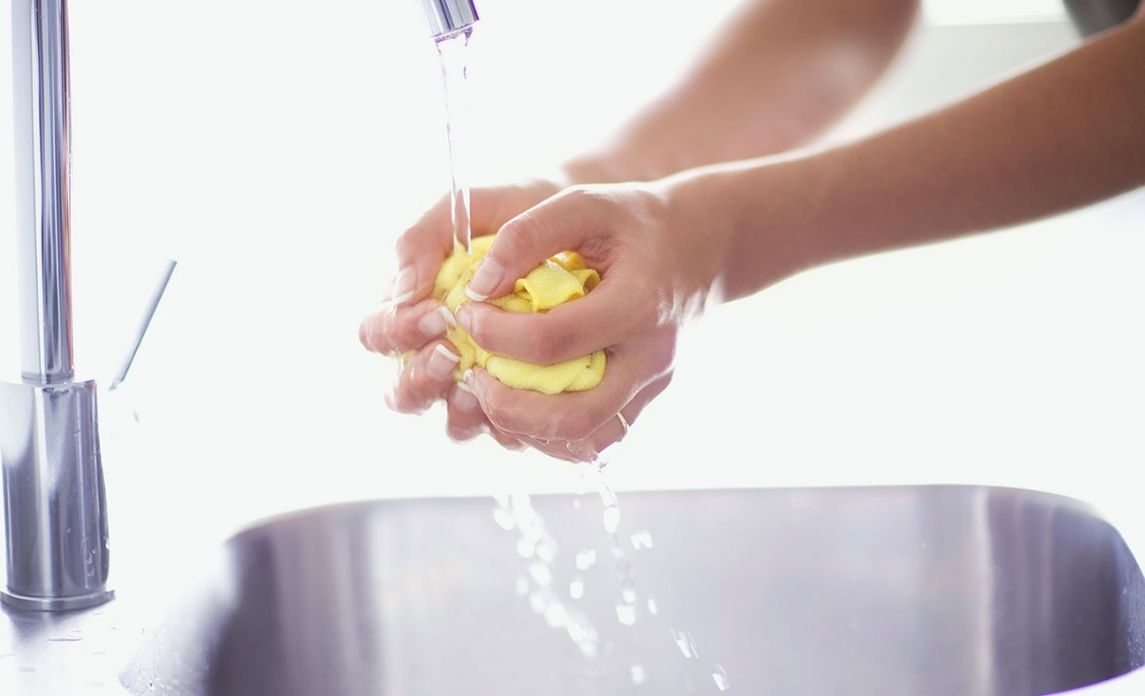It shouldn’t come as a surprise that office spaces can get unhealthy and unhygienic if they aren’t well maintained. With so many people moving through the bathrooms, kitchens, and common areas every day – it can quickly become a breeding ground for germs.
Dr Charles Gerba is a professor and microbiologist in Tucson, Arizona. He has been studying the presence of household bacteria since the early 1970s. Dr Gerba’s studies have found that a kitchen sink can contain more dangerous germs than those inside the toilet! Drains and sinks are dark and damp, which is the perfect conditions for moulds and bacteria to grow. The bacteria also feed on the food scraps and crumbs from the dishes – making it the perfect environment for them to thrive!
So, in case that hasn’t made your skin crawl enough, here are some more specific examples of bacteria that could be lurking in the kitchen sink at your office.
E Coli
Escherichia Coli is best known as the bacteria that cause food poisoning, pneumonia, and urinary tract infections. We all have E Coli bacteria in our gut that are beneficial to our health, but certain strains of E Coli are pathogenic and can transmit illnesses through contaminated water and food.
A kitchen sink might contain pathogenic E Coli bacteria if it has been in contact with contaminated water or food, or if someone carrying the bacteria has been in contact with the sink area. A common cause of E Coli in office sinks is people not washing their hands after using the bathroom and then using the office kitchen to prepare food or beverages. Studies have shown that at least 40% of people at work do not regularly wash their hands after using the toilet.
Campylobacter
Campylobacter jejuni is another leading cause of food poisoning. They are aggressive bacteria and it takes as little as 500 bacteria cells to cause illness. Infants and children under the age of 5 are most susceptible. Campylobacter can end up in a kitchen sink from exposure to raw milk or raw meats (especially poultry), unchlorinated water, or infected vegetables.
Salmonella
Salmonella can be spread through contact with kitchen sinks due to the presence of raw meat, contaminated dairy and spices, or often, fresh produce. Anything that has been in contact with the bacteria could potentially spread it around. Salmonella infection can cause stomach cramps, muscle pains, fever, nausea, and diarrhoea.
Staph
Staphylococcus aureus is another common bacteria that can cause food poisoning and pneumonia, as well as skin infections and toxic shock. Staph thrives in damp conditions but is also resilient to dry environments, which means it can survive in sinks even if they are not used often.
Foods that are meant to be refrigerated but have become warm can spread staph, and this is usually how bacteria ends up in the kitchen’s immediate environment. This includes meat and dairy products and other deli-style foods. People coughing or sneezing over a kitchen surface, or by touching a staph infection on the skin and then using the kitchen facilities can also spread the bacteria.
How to prevent it
A regular and thorough clean is the only way to reduce the risk of spreading illnesses. In a kitchen sink, use hot water and an antibacterial product at least once every 2 days. It’s a good habit to get into because it’s going to reduce the amount of food build up in the bottom of the sink and help to prevent blockages in the drains. You could also use a drain-cleaning product once every week or so to keep on top of it.
It’s also good to keep proper hygiene and etiquette at the front of everyone’s minds. Be sure to keep signs in the bathrooms about hand hygiene, and signs in the kitchen reminding people to clean up their messes and reduce the build-up of grime and old food.
Keeping an office clean and hygienic is a big task, and to make sure it’s done well you really can’t beat a professional commercial cleaner. An unhealthy office spreads illnesses throughout the staff, which lowers morale, reduces productivity, and costs the business a lot of money.

Crewcare uses a microfibre cloth system that prevents cross-contamination between kitchen and bathroom areas. You can trust us to provide a thorough and efficient cleaning service at an affordable price, and that is tailored to the needs of you and your business. Our staff are highly trained and security vetted for your peace of mind, and to ensure a quality and professional job every time.
If you are looking for a trusted, New Zealand owned, and professional cleaning service for your office – contact Crewcare now.


